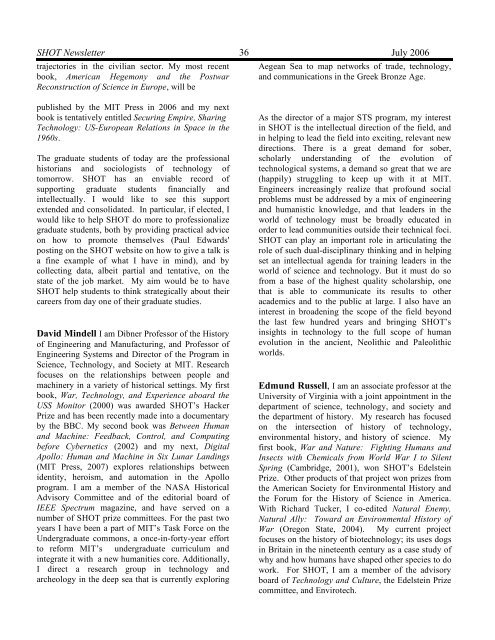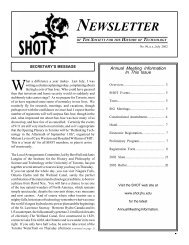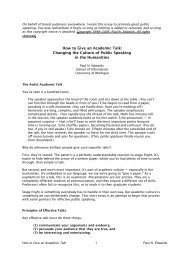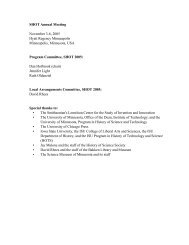In This Issue - Society for the History of Technology
In This Issue - Society for the History of Technology
In This Issue - Society for the History of Technology
Create successful ePaper yourself
Turn your PDF publications into a flip-book with our unique Google optimized e-Paper software.
SHOT Newsletter 36<br />
July 2006<br />
trajectories in <strong>the</strong> civilian sector. My most recent<br />
book, American Hegemony and <strong>the</strong> Postwar<br />
Reconstruction <strong>of</strong> Science in Europe, will be<br />
published by <strong>the</strong> MIT Press in 2006 and my next<br />
book is tentatively entitled Securing Empire, Sharing<br />
<strong>Technology</strong>: US-European Relations in Space in <strong>the</strong><br />
1960s.<br />
The graduate students <strong>of</strong> today are <strong>the</strong> pr<strong>of</strong>essional<br />
historians and sociologists <strong>of</strong> technology <strong>of</strong><br />
tomorrow. SHOT has an enviable record <strong>of</strong><br />
supporting graduate students financially and<br />
intellectually. I would like to see this support<br />
extended and consolidated. <strong>In</strong> particular, if elected, I<br />
would like to help SHOT do more to pr<strong>of</strong>essionalize<br />
graduate students, both by providing practical advice<br />
on how to promote <strong>the</strong>mselves (Paul Edwards'<br />
posting on <strong>the</strong> SHOT website on how to give a talk is<br />
a fine example <strong>of</strong> what I have in mind), and by<br />
collecting data, albeit partial and tentative, on <strong>the</strong><br />
state <strong>of</strong> <strong>the</strong> job market. My aim would be to have<br />
SHOT help students to think strategically about <strong>the</strong>ir<br />
careers from day one <strong>of</strong> <strong>the</strong>ir graduate studies.<br />
David Mindell I am Dibner Pr<strong>of</strong>essor <strong>of</strong> <strong>the</strong> <strong>History</strong><br />
<strong>of</strong> Engineering and Manufacturing, and Pr<strong>of</strong>essor <strong>of</strong><br />
Engineering Systems and Director <strong>of</strong> <strong>the</strong> Program in<br />
Science, <strong>Technology</strong>, and <strong>Society</strong> at MIT. Research<br />
focuses on <strong>the</strong> relationships between people and<br />
machinery in a variety <strong>of</strong> historical settings. My first<br />
book, War, <strong>Technology</strong>, and Experience aboard <strong>the</strong><br />
USS Monitor (2000) was awarded SHOT’s Hacker<br />
Prize and has been recently made into a documentary<br />
by <strong>the</strong> BBC. My second book was Between Human<br />
and Machine: Feedback, Control, and Computing<br />
be<strong>for</strong>e Cybernetics (2002) and my next, Digital<br />
Apollo: Human and Machine in Six Lunar Landings<br />
(MIT Press, 2007) explores relationships between<br />
identity, heroism, and automation in <strong>the</strong> Apollo<br />
program. I am a member <strong>of</strong> <strong>the</strong> NASA Historical<br />
Advisory Committee and <strong>of</strong> <strong>the</strong> editorial board <strong>of</strong><br />
IEEE Spectrum magazine, and have served on a<br />
number <strong>of</strong> SHOT prize committees. For <strong>the</strong> past two<br />
years I have been a part <strong>of</strong> MIT’s Task Force on <strong>the</strong><br />
Undergraduate commons, a once-in-<strong>for</strong>ty-year ef<strong>for</strong>t<br />
to re<strong>for</strong>m MIT’s undergraduate curriculum and<br />
integrate it with a new humanities core. Additionally,<br />
I direct a research group in technology and<br />
archeology in <strong>the</strong> deep sea that is currently exploring<br />
Aegean Sea to map networks <strong>of</strong> trade, technology,<br />
and communications in <strong>the</strong> Greek Bronze Age.<br />
As <strong>the</strong> director <strong>of</strong> a major STS program, my interest<br />
in SHOT is <strong>the</strong> intellectual direction <strong>of</strong> <strong>the</strong> field, and<br />
in helping to lead <strong>the</strong> field into exciting, relevant new<br />
directions. There is a great demand <strong>for</strong> sober,<br />
scholarly understanding <strong>of</strong> <strong>the</strong> evolution <strong>of</strong><br />
technological systems, a demand so great that we are<br />
(happily) struggling to keep up with it at MIT.<br />
Engineers increasingly realize that pr<strong>of</strong>ound social<br />
problems must be addressed by a mix <strong>of</strong> engineering<br />
and humanistic knowledge, and that leaders in <strong>the</strong><br />
world <strong>of</strong> technology must be broadly educated in<br />
order to lead communities outside <strong>the</strong>ir technical foci.<br />
SHOT can play an important role in articulating <strong>the</strong><br />
role <strong>of</strong> such dual-disciplinary thinking and in helping<br />
set an intellectual agenda <strong>for</strong> training leaders in <strong>the</strong><br />
world <strong>of</strong> science and technology. But it must do so<br />
from a base <strong>of</strong> <strong>the</strong> highest quality scholarship, one<br />
that is able to communicate its results to o<strong>the</strong>r<br />
academics and to <strong>the</strong> public at large. I also have an<br />
interest in broadening <strong>the</strong> scope <strong>of</strong> <strong>the</strong> field beyond<br />
<strong>the</strong> last few hundred years and bringing SHOT’s<br />
insights in technology to <strong>the</strong> full scope <strong>of</strong> human<br />
evolution in <strong>the</strong> ancient, Neolithic and Paleolithic<br />
worlds.<br />
Edmund Russell, I am an associate pr<strong>of</strong>essor at <strong>the</strong><br />
University <strong>of</strong> Virginia with a joint appointment in <strong>the</strong><br />
department <strong>of</strong> science, technology, and society and<br />
<strong>the</strong> department <strong>of</strong> history. My research has focused<br />
on <strong>the</strong> intersection <strong>of</strong> history <strong>of</strong> technology,<br />
environmental history, and history <strong>of</strong> science. My<br />
first book, War and Nature: Fighting Humans and<br />
<strong>In</strong>sects with Chemicals from World War I to Silent<br />
Spring (Cambridge, 2001), won SHOT’s Edelstein<br />
Prize. O<strong>the</strong>r products <strong>of</strong> that project won prizes from<br />
<strong>the</strong> American <strong>Society</strong> <strong>for</strong> Environmental <strong>History</strong> and<br />
<strong>the</strong> Forum <strong>for</strong> <strong>the</strong> <strong>History</strong> <strong>of</strong> Science in America.<br />
With Richard Tucker, I co-edited Natural Enemy,<br />
Natural Ally: Toward an Environmental <strong>History</strong> <strong>of</strong><br />
War (Oregon State, 2004). My current project<br />
focuses on <strong>the</strong> history <strong>of</strong> biotechnology; its uses dogs<br />
in Britain in <strong>the</strong> nineteenth century as a case study <strong>of</strong><br />
why and how humans have shaped o<strong>the</strong>r species to do<br />
work. For SHOT, I am a member <strong>of</strong> <strong>the</strong> advisory<br />
board <strong>of</strong> <strong>Technology</strong> and Culture, <strong>the</strong> Edelstein Prize<br />
committee, and Envirotech.





